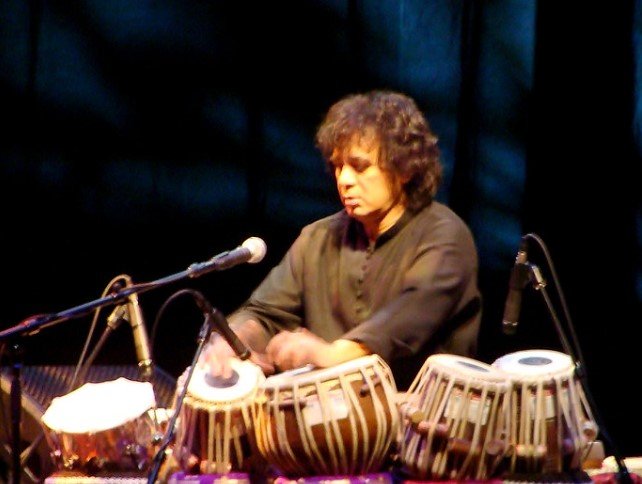The Passing of a Global Legend
The world of music has lost one of its brightest stars. Tabla maestro Ustad Zakir Hussain, whose intricate rhythms brought new life to the iconic Indian instrument, passed away on December 16, 2024, in San Francisco. At 73, he leaves behind an unparalleled legacy that forever changed the landscape of both classical and contemporary music.
Hussain’s artistry was much more than virtuosity. His ability to blend traditional Indian rhythms with global sounds made him an international icon. Whether on stage with classical musicians, in fusion collaborations, or scoring soundtracks for Bollywood films, Zakir Hussain’s tabla resonated with an unmatched depth. But what truly set him apart was his commitment to using music as a universal language—a language of peace, compassion, and unity.
A Maestro Who Redefined the Tabla
Born into a family steeped in music, Zakir Hussain was destined for greatness. His father, the legendary Ustad Allah Rakha, was a renowned tabla virtuoso, and it was under his guidance that Hussain began his musical journey. But Zakir went beyond merely inheriting the craft. He revolutionized the way the tabla was perceived globally, transforming it from a traditional instrument of Indian classical music to a symbol of cultural exchange.

Over the years, Zakir’s tabla became the centerpiece of collaborations across genres. Whether it was his work with Western artists like George Harrison of The Beatles, or jazz greats like John McLaughlin and Herbie Hancock, Hussain’s rhythmic genius seamlessly bridged the gap between East and West. His performances were not just concerts—they were conversations, with the tabla speaking a language everyone could understand, regardless of their cultural background.
His artistry extended beyond the stage, reaching deep into the heart of the global music scene. From his Grammy-winning albums to his role in pioneering the genre of fusion music, Zakir’s influence was undeniable. His contributions to Indian classical music earned him prestigious awards, including the Padma Bhushan and Padma Vibhushan, and his international recognition helped bring Indian percussion to the global forefront.
A Legacy of Peace Through Music
What set Ustad Zakir Hussain apart was not just his technical brilliance but his philosophy of music as a tool for unity. His love for rhythm, sound, and melody transcended national boundaries. Hussain’s tabla was more than just an instrument—it was a message of peace. His collaborations with artists from different parts of the world showcased his belief that music could unite diverse cultures and bring people together.
Hussain’s music was not only an intellectual pursuit—it had soul. Every note he played resonated with humanity, reflecting his deep understanding of spirituality and the oneness of the universe. His upbringing, where he learned to sing hymns from the Quran, Bible, and Indian scriptures, gave his music a unique, spiritual dimension. His tabla wasn’t just percussion; it was a voice for the voiceless, a bridge between differing cultures, and a vessel for the universal search for peace.
A true master, Hussain’s concerts were often filled with the sounds of collaboration. Whether it was a quiet conversation between instruments or a full-throttle improvisational performance, his mastery of rhythm and tempo kept his audiences captivated. Through his music, Zakir Hussain demonstrated that the tabla was not limited to classical spaces—it had a place on the world stage.
A Look at Some Milestones in Hussain’s Career:
- Three Grammy Awards in one night (February 2024) for his contribution to both classical and fusion music.
- Collaborations with iconic Western artists like George Harrison, Herbie Hancock, and John McLaughlin.
- Masterful performances at prestigious venues around the world, such as the Carnegie Hall and the Royal Albert Hall.
- Deep impact on the global recognition of Indian classical music.
A Master of Rhythm: The Tabla’s Champion
Though he was known for his international collaborations, Ustad Zakir Hussain never strayed from his classical roots. His training in the traditional Hindustani style was rigorous, and he held the principles of tala (rhythm) and laya (tempo) in the highest regard. He often spoke about the importance of staying true to the classical tradition while also experimenting with new forms.
His performances were often intense, yet there was a certain fluidity to them. Hussain’s ability to merge complex rhythmic structures with an almost effortless grace captivated his listeners. For him, music wasn’t just about technicality—it was about expression, a reflection of the world around him. His tabla played with an honesty that was palpable, drawing on ancient traditions while simultaneously pushing the boundaries of modern musicality.
Zakir’s music spoke volumes without saying a word. Through every stroke on the tabla, there was a conversation, a message, a rhythm that resonated beyond language. He could tell a story without uttering a single word, and that’s what made him truly exceptional.
Hussain’s Cultural Impact: A Table of Global Contributions
| Year | Milestone |
|---|---|
| 1987 | First international tour with the “Shakti” group |
| 2002 | Co-founded the “Tabla Talk” initiative to promote tabla education worldwide |
| 2024 | Won 3 Grammy Awards for his fusion music collaborations |
| 2024 | Final performance at the Royal Albert Hall, London |
Ustad Zakir Hussain’s passing marks the end of an era for tabla music, but his legacy will continue to echo through the sounds of the instrument for generations. As a teacher, performer, and global ambassador for Indian music, he made the tabla a symbol of connection across borders. His artistry has not only transformed the instrument but has made the world a little more harmonious.
